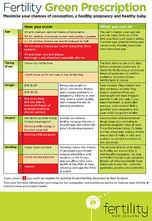Weight
There is evidence that both female and male fertility are decreased by being either significantly overweight (obese) or underweight. It is recommended that people aiming to conceive naturally or with ART maintain a healthy body weight (BMI between 20 and 25).
Obesity in men is associated with infertility by causing impaired semen quality, decreased libido and erectile dysfunction.
In women obesity decreases fertility and may be associated with conditions such as PCOS, and can also impact pregnancy health. During pregnancy, being overweight or obese are associated with an increased risk of miscarriage, gestational diabetes, pre-eclampsia, premature births, stillbirths and perinatal mortality. The babies of overweight mothers are more likely to be obese and suffer cardiovascular disease and diabetes as adults. Thus, women with a BMI of more than 32 must lose weight in order to become eligible for publicly funded fertility treatment in New Zealand.
A 6-month group programme for overweight infertile women, which provided dietary and exercise advice alongside support to make healthy changes, was shown to be effective (1). The women had an average weight loss of 5kg and most of the women who did not ovulate resumed spontaneous ovulation.
Low body weight can prevent normal ovulation and may also reflect a poor nutritional status which can ultimately affect the health of the pregnancy and baby: Low maternal weight before pregnancy and poor weight gain during pregnancy are known to result in an increased chance of pre-term delivery and low birth weight infants.
(1) Kidd, S.A., Eskenazi, B., and Wyrobek, A.J.”, Effects of male age on semen quality and fertility: a review of the literature.” Fert. Steril. (2001) 75 (2): 237–48


